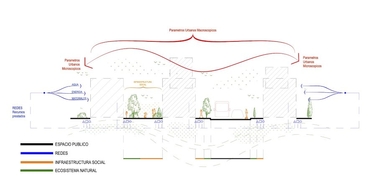Serviland and IE University call for cross-cutting urban planning regulations focused on sustainability

New study by IE Center for Sustainable Cities and Serviland advocates strategies for sustainable urban development, focusing on early planning and urbanization phases.
IE Center for Sustainable Cities (CSC) of IE School of Architecture and Design in collaboration with Serviland, Servihabitat's subsidiary specializing in land management, new construction and work-in-progress portfolios, have called for cross-cutting urban planning regulations based on linking traditional factors such as buildability to environmental or social considerations to promote the sustainable development of cities.
This is one of the main proposals in a new study by the two organizations that analyzes, evaluates and advocates strategies to promote a sustainable urban development model focused on the initial phases of planning and urbanization. It concludes that while measures to promote sustainability may increase construction costs in the short term, a medium- and long-term approach will see a return on investment.
To compensate between the social and environmental benefit and short-term costs, Serviland and IE’s CSC recommend cross-cutting urban planning standards that promote sustainable development through incentives and bonuses to encourage investment in sustainability.
Ernesto Tarazona, CEO of Serviland, explains: "Unlike the existing incentives to promote sustainable building, in the case of planning and urbanization there are no means through which the public administration can promote sustainable urban development". The solution, says Tarazona, “is the fundamental participation of the public administration, but also of urban developers, the financial sector and even society as a whole, with an active role for citizens".
"This new framework advocates public-private collaboration to promote the sustainable development of urban environments."
Ernesto Tarazona, CEO of Serviland
Cross-cutting urban planning regulations link environmental and social benefits with incentives in the form of urban planning parameters, municipal fees and taxes, urban planning procedures, financing and consumption.
"The regional governments of Andalusia and Catalonia, along with the cities of Madrid and Barcelona, are benchmarks for sustainable urban development in Spain."
The study also includes an exhaustive comparison based on seven sustainability indicators of the respective land laws of Spain’s 17 autonomous communities and the urban planning regulations of the country’s 13 main cities.
"The biggest challenge of sustainability is not in identifying the parameters that have the greatest impact, but in their cross-cutting nature and the implications and consequences of decisions in areas that at first seemed disconnected or unrelated," says Ernesto Tarazona.
"This research is based on a solid theoretical framework, and has been designed as a practical tool aimed at facilitating its application by urban planners, policymakers and researchers committed to urban sustainability."
Manuel Pérez, Chair of IE Center for Sustainable Cities
The study shows that Andalusia and Catalonia are the Spanish regions with the most up-to-date regulations and that have most effectively integrated sustainability principles into their land laws, promoting the integration of renewable energies, efficient water management and community participation.
However, regions such as Murcia and La Rioja show significant areas for improvement. These communities have not integrated sustainability into their regulations fully, and there is a lack of cohesion in the implementation of energy and water management policies.
The report’s comparison of the urban planning regulations of Spain’s main cities reveals that there is significant diversity in how sustainable policies are addressed. Barcelona and Madrid stand out for their advanced and holistic approaches.
In conclusion, the study underlines the importance of keeping land laws updated and aligned with the principles of sustainability, as well as integrating renewable energies, efficient water management and the active participation of the community.